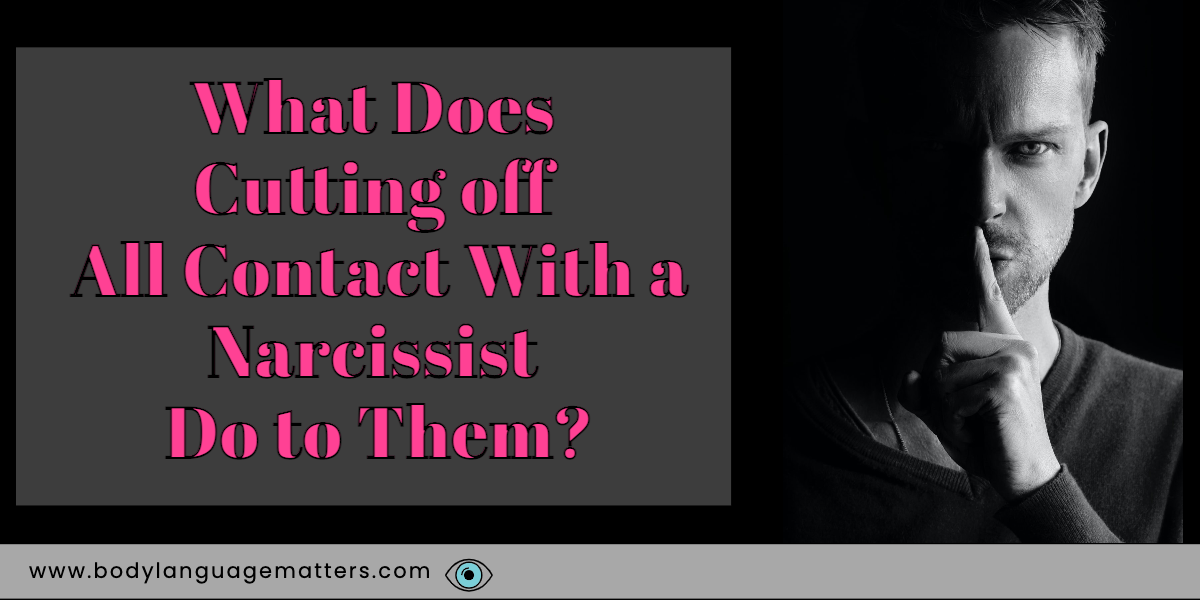Cutting off all contact with a narcissist will be hard to do but it will be worth it. It is the only way that you can get them out of your life for good. This is the most powerful tool and tactic at your disposal.
It can be tough to cut off contact with a narcissist. Sometimes they may be someone who is important in your life, like a coworker or friend.
You might have tried leaving them alone and hoped that they would eventually come around, but it never happened. In this article we will look at 6 things cutting off all contact does to a narcissist.
What happens when you stop reacting to a narcissist?
The most common response to narcissistic abuse is to keep reacting. This sometimes happens because the victim genuinely cares about the narcissist or because they have been manipulated into thinking that the narcissist cares about them.
However, there comes a point where it is necessary to stop reacting. This can be difficult, but it is important for the victim’s mental and emotional health.
When the victim stops reacting, the narcissist is forced to confront their own behavior. This often leads to the narcissist becoming angry or aggressive. In some cases, it may even lead to the narcissist leaving the victim alone. Here are six things that happen to a narcissist when you cut all contact with them.
Six Things That Happen To A Narcissist After No Contact.
It’s never fun, and it’s never great when a narcissist tries every trick in the book to break you into reacting or speaking with them. It’s important for you not to make contact with them to break that cycle of control over you.
Tactics a narcissist will use to gain control over you again.
1. Repeat Old Tactics.
A narcissist will go back to default and go back to what worked for them before, testing this out on you to see if they can get you to react emotionally. This is the first contact phase where they charm you into thinking they are a nice person.
You may have a kind and caring nature, don’t be fooled by this tactic. It’s the first thing a narcissist will try to do to win you back over and start the process over again.
2. Intensify Pressure.
If the first round of changing tactics doesn’t work, they will intensify their tactics on you, sometimes called love bombing. They are everywhere you go, talking to all your friends and family members, and showing up after work. They will call you all the time, send hundreds of messages, and leave messages with friends, they may also buy you flowers and gifts to win you back.
This could also be flipped on its head by reverting back to being aggressive towards you, leaving nasty messages, showing up late at night, or parking outside your house.
All of the above is a way to try and get you to give up by wearing you down instead of fighting them.
I want you to remember that no matter how much they try to win you over or the pressure they put on you, it’s just a tactic and it will soon pass.
3. Triangulation.
A narcissist will do anything to increase the credibility and validity of their point of view they will try and make you look like the crazy person
This is why people who are victims of Narcissistic Abuse tend to be told that their reactions to the abuse are unreasonable and that they need to examine themselves. It’s a way for the abuser to divert attention away from what they’re doing, a tactic called ‘gaslighting’.
4. Anger.
Once they have tried the above or a few other tactics and figured out that nothing is working for them, the next step for a narcissist is anger. This is because you have triggered them and they don’t know what to do next.
A narcissist may try telling you want to do or how to behave towards them and what they want.
Being a narcissist is a lot like being in a never-ending battle. If you have been on the receiving end of their aggression, you know it’s not fun and it can be exhausting. But don’t give up on your rule of no contact.
Eventually, the narcissist will show their true colors. They’ll start making mistakes that reveal their real character to the world–just like they’ve done to you all along. When this happens, know that you’re on the right track.
Don’t give up; narcissists are usually the worst right when they are about to give in.
5. Narcissist Implosion.
You know it’s almost over when you witness a narcissist implosion. A narcissist implosion is collapsing violently inwards. They will self-destruct trying to make sense of the world. This will happen in their head, but also in the environment around them, where they will do anything to get attention, good or bad.
6. Find A New Person.
When a narcissist finds another source of power or emotions, you know it’s finally over. A narcissist will eventually give up because they need a new supply to feed off. They will have worked out that their previous victim is no longer supplying the old levels of supply and has moved on.
Questions And Answers.
What are the benefits of stopping reacting to a narcissist?
There are a number of benefits to stopping reacting to a narcissist. One benefit is that it can help to reduce the amount of drama in your life. Another benefit is that it can help you to maintain your own sanity and emotional well-being. Additionally, it can help you to protect yourself from further emotional and/or physical harm.
What are the challenges you might face when trying to stop reacting to a narcissist?
Narcissists are experts at manipulating people and getting them to react to them. They may use a variety of tactics, such as guilt-tripping, playing the victim, or anger-baiting, to get you to react to them. It can be difficult to break this pattern of reacting to a narcissist, but it is possible. Some tips for how to stop reacting to a narcissist include:
- Identifying the narcissist’s tactics and learning to recognize them.
- Setting boundaries with the narcissist and holding them accountable for their behaviour.
- Focusing on your own needs and wants, rather than reacting to the narcissist.
- Disengaging from the narcissist by limiting.
How can you tell if you’re successfully stopping reacting to a narcissist?
The only way to be sure you’re successfully stopping reacting to a narcissist is to never interact with them again. If you find yourself getting upset or defensive in response to something they’ve said or done, it means you’re still reacting to them.
What are some strategies for stopping reacting to a narcissist?
There is no one-size-fits-all answer to this question, as the best way to deal with a narcissist may vary depending on the individual situation. However, some suggested strategies for managing or stopping reactions to a narcissist include:
- Identifying and acknowledging your own personal triggers, and working to avoid or de-escalate situations that may trigger them.
- Establishing and maintaining clear boundaries with the narcissist, and being assertive in communicating these boundaries to them.
- Practising self-care, including making time for yourself and your own interests outside of the relationship with the narcissist.
- Seeking support from trusted friends or family members, or professional help from a therapist or counsellor.
Summary
What does cutting off all contact with a narcissist do to them it will drive them crazy and eventually they will leave you alone if you have the right strategy in place. The key to cutting off all contact with a narcissist is to do it gradually. You don’t want to cause a scene and have them come after you for revenge.
If you have enjoyed reading this article on narcissistic behavior, check out similar ones here.

